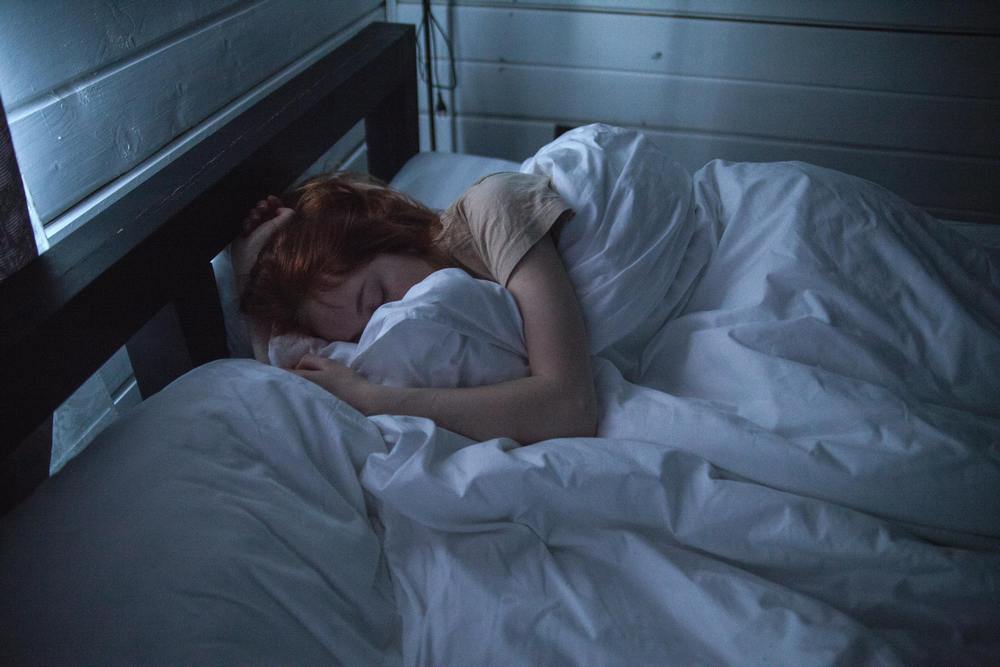 I admit it.
I admit it.
I’m guilty of relying on weed to help me fall asleep most nights.
It’s just such a great way to fall asleep!
And it works. I’m out within minutes of my head hitting the pillow.
Falling asleep so easily is one of the major benefits of using marijuana for sleep.
But there are some concerning drawbacks, too.
I did not know about them until I researched this article. Now I’m rethinking my reliance on cannabis to help me fall asleep quickly.
Keep reading to learn why and to find out if you are using marijuana for sleep in the right way. Because it does seem like it can help, as long as you follow a few guidelines.
Contents
The Science Behind Marijuana And Sleep
Marijuana is generally recognized as an effective sleep aid because it may help restore our natural sleep cycle, which often becomes disrupted in our modern lives. For short-term use, cannabis can be beneficial in helping people fall asleep more quickly.
Current research on cannabis mostly indicates that it can positively impact sleep disorders and improve patient-reported sleep scores.
About 83% of users found that cannabis helped relax their minds, and 81.0% reported bodily relaxation. Additionally, 56.2% of users experienced deeper sleep.

A word of caution: most experts generally agree that THC in cannabis can promote sleep, but its effectiveness varies depending on the specific sleep issue and the individual.
Also, similar to other sleep aids, it may only be beneficial in the short term and could even throw off sleep cycles if used long-term.
Possible Benefits Of THC On The Sleep Cycle
THC is the main cannabinoid in marijuana. It interacts with the cannabinoid receptors in the brain. These receptors play a key role in regulating our sleep.
When THC binds to these receptors, it helps modulate sleep patterns. It also increases the amount of non-rapid-eye movement (NREM) sleep, which is the deep, restful sleep phase.
THC also reduces the time it takes to fall asleep (sleep latency). In simple terms, THC can help you fall asleep faster and enjoy deeper sleep.
Potential Drawbacks Of THC On Sleep
All is not straightforward, though. Recent research shows that cannabis strains with higher THC levels could negatively impact sleep.
High THC levels reduce the time spent in REM sleep, which is important for dreaming and cognitive functions. Instead, it increases the time spent in slow-wave sleep, a deeper phase of sleep.
This finding is contradictory because other research has shown that high doses of CBD, another compound in cannabis, may help improve sleep. But high doses of THC seem to obstruct sleep.
Therefore, it’s important to be careful with the amount and type of cannabis you take to aid sleep. Microdosing marijuana is one way to deal with this issue.
Role Of CBD On Sleep

CBD may enhance both the quality and quantity of sleep. It helps the body progress through the normal stages of sleep and REM sleep without interruption, which is beneficial for those with circadian rhythm disorders.
CBD is also commonly used to reduce pain and anxiety, which can further aid in better sleep. However, the effects of CBD on sleep can vary depending on the dosage and individual tolerance, and more studies are needed to assess its exact effects.
Benefits Of Marijuana for Sleep
Here are the possible benefits of cannabis on sleep:
It Helps Users Fall Asleep Faster
Some strains of marijuana may help users fall asleep faster due to cannabinoids that assist with chronic pain, PTSD, and restless leg syndrome.
Cannabis may even suppress arousal, increase adenosine, and restore the natural sleep cycle by reducing nighttime waking and promoting longer sleep.
However, its effectiveness depends on the THC and CBD content of the strain, as well as on individual tolerance. This makes it very important to choose the right strain and dosage for optimal results.
It Enhances Sleep Quality

Marijuana may impact sleep by increasing time spent in non-rapid eye movement (NREM) sleep, which helps you wake up feeling refreshed. However, THC reduces the time spent in rapid eye movement (REM) sleep, which is crucial for dreaming, processing emotions, and memory consolidation.
There is evidence that reducing REM sleep can benefit people with PTSD, because it can decrease nightmares. A study found that women with severe PTSD symptoms and poor sleep often used cannabis for relief, with good results.
The study also showed that synthetic cannabis significantly prevented nightmares in traumatized patients. These patients also reported better sleep quality and fewer daytime stress episodes.
It Reduces Sleep Disorders And Night Terrors
Lower levels of cannabis can help alleviate sleep disorders such as insomnia, sleep apnea, restless leg syndrome, and PTSD. People with chronic anxiety, pain, and epilepsy also report better sleep after using cannabis.
The cannabinoids in marijuana can promote relaxation, reduce pain, and lessen anxiety, contributing to improved sleep. However, there are very few studies on this topic, so it is essential to consult a doctor before using cannabis for sleep-related issues.
Potential Risks Of Using Marijuana For Sleep

Marijuana can also have potential ill effects for those using it for sleep. As stated above, higher THC levels may result in less overall sleep, reduced deep sleep, a longer time to fall asleep, and frequent awakenings. Some people also experience daytime sedation from excessive cannabis use the night before.
Some studies suggest that regular marijuana use could negatively impact sleep quality. Also, long-term cannabis use is known to result in withdrawal symptoms like impaired sleep and dizziness and is also linked to an increased risk of depression and cardiovascular diseases. Therefore, it is important to use marijuana cautiously and consult a doctor for guidance.
Appropriate Dosage And Strain Selection
To select the right dose of cannabis, consider the CBD to THC ratio, which plays a crucial role. However, there is no one-size-fits-all ratio for sleep-related conditions and each individual will react differently.
Generally, a balanced 1:1 CBD:THC ratio is supposed to provide many medical benefits. Strains with balanced CBD: THC ratios are known to be effective in addressing pain and neurological issues, and provide other sleep benefits. However, it is best that you consult with a healthcare provider to determine the best ratio and formulation that suit your specific needs.
Best Strains For Sleep
For sleep, Indica-dominant cannabis strains are usually the best. These strains are known for their relaxing effects and help users unwind and prepare for sleep. They are best used in the evening.
Popular choices include Kush, Granddaddy Purple, Bubba Kush (Indica Queen), Northern Lights, Deep Sleep, Harlequin, Grape Ape, Girl Scout Cookies, Cherry Pie, Pink Kush, ACDC, and Gelato. Their soothing qualities make them ideal for promoting a calm state conducive to restful sleep.
Note that many of these indica strains are not for beginners. They can induce heavy body highs that impart a deep sense of peace and relaxation, so please exercise caution when using them.
How you consume cannabis makes a difference too. Read this article on the various ways to consume marijuana.
Benefits Of Marijuana For Sleep: Final Thoughts

Marijuana shows promise as a potential sleep aid, offering benefits such as faster sleep onset, improved sleep quality, and relief from certain sleep disorders.
The cannabinoids in marijuana, particularly THC and CBD, interact with the body’s endocannabinoid system to influence sleep patterns and promote relaxation.
However, it’s crucial to approach the use of marijuana for sleep with caution. While short-term use may be beneficial, long-term use could lead to adverse effects on sleep cycles and overall health.
The effectiveness of marijuana as a sleep aid varies depending on factors such as strain selection, THC:CBD ratio, dosage, and individual physiology.
Moreover, you should not overlook potential risks and side effects, including decreased REM sleep and the possibility of developing tolerance or dependence.
It’s essential to consult with a healthcare professional before using marijuana for sleep-related issues, especially if you have pre-existing medical conditions or you are taking other medications.
As research in this field continues to evolve, a more comprehensive understanding of marijuana’s effects on sleep will emerge.
For now, if you are considering using marijuana for sleep, you should approach it as part of a broader sleep hygiene strategy, rather than a standalone solution.
Ultimately, the key lies in finding the right balance and approach that works best for your unique sleep needs and overall health.
Leave a Reply